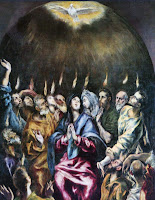 |
| Portion of El Greco’s “Pentecost” (c. 1600) |
Being a disciple of Jesus in the first century was not easy! As we have discussed in previous posts, some of his teachings were very difficult to follow and some of his actions broke all of the rules of good behavior set by the Pharisees, who were respected by Jews in conservative religious circles.
When he touched lepers, recruited a hated tax collector into his inner circle of disciples, talked with a Samaritan woman, healed people on the Sabbath – these were all actions of an unusual teacher. This rabbi was challenging the religious establishment of his day, with all of their rules and prohibitions about not dealing with the outcasts in society or their neighboring Samaritans, and the disciples had to figure how to be faithful followers.
Then comes the Passover Feast when Jesus rides into Jerusalem on a donkey and the crowds cheer him and hail him as a political liberator. This seemed to be the time when Jesus would truly become the King of the Jews and together they would break the bonds of Roman oppression. But what does Jesus do? As we discussed in the last post, he withdraws from the crowd, loses all of this momentum, and winds up being arrested, tried and executed.
Before he died on the cross, Jesus promised to send his disciples a “Counselor” or “Helper” and he repeated this promise when he met them following his resurrection as they hid out of fear that they would also be arrested and punished. Of course the disciples were excited when they learned the news of Jesus’ resurrection, but they were still confused about his mission. On the day of Jesus’ ascension into heaven, forty days after his resurrection, the disciples were still wondering when Jesus was going to “restore the Kingdom to Israel” (Acts 1:6).
Let’s face it – the disciples were like us. Being a disciple of Jesus in the twenty-first century is also not easy. There are times when I am also confused about what God is doing in this world and how I am to follow his commands, times when I just don’t seem to get it. Having to suspend RAI’s undergraduate program after fourteen years is an example where I thought I was doing what God wanted me to do. Only now am I beginning to see that God’s plan may be much more significant than I understood it to be.
Things changed for the disciples ten days after Jesus’ ascension, when the promise of the “counselor” was fulfilled. At Pentecost, the disciples were “filled with the Holy Spirit” with dramatic results. No longer would they flee persecution as they had on the night of Jesus’ arrest in the Garden of Gethsemane. They were now “fired up” and became fearless witnesses of the gospel of peace!
So What?
- When facing difficult challenges, we need to remind ourselves that God has given us the power, the strength, to persevere — this is the gift of the Holy Spirit. We can’t make it on our own, but God does not leave us on our own. We have a promised “Helper” and this makes all the difference.
- The change in the disciples after Pentecost is truly amazing. If you want to study this further, get the book by Professor Michael Green, Thirty Years That Changed the World. Here’s his summary: “Three crucial decades in world history. That is all it took. In the years between A.D. 33 and 64 a new movement was born. In those thirty years it got sufficient growth and credibility to become the largest religion the world has ever seen and to change the lives of hundreds of millions of people.”
- If you have doubts about your faith or are confused about how to live as a follower of Jesus in our world, don’t be distressed. Doubt is not the opposite of faith, fear is. Doubt can eventually lead to a stronger faith, to a better understanding of God’s Word, if you ask God to help you as he promised through his Holy Spirit.